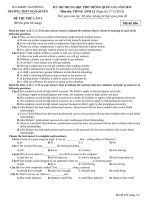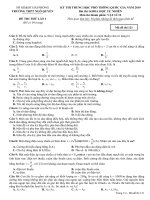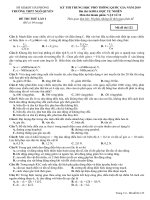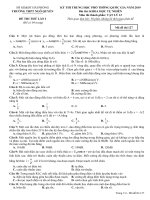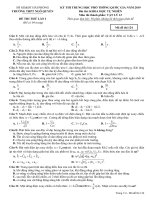Đề thi thử THPT Quốc Gia 2019 môn Tiếng Anh trường THPT Ngô Quyền, TP Hải Phòng lần 1 mã đề 656.pdf - Học Toàn Tập
Bạn đang xem bản rút gọn của tài liệu. Xem và tải ngay bản đầy đủ của tài liệu tại đây (585.04 KB, 4 trang )
<span class='text_page_counter'>(1)</span><div class='page_container' data-page=1>
Mã đề 656 trang 1/4
SỞ GD&ĐT HẢI PHỊNG
<b>TRƯỜNG THPT NGƠ QUYỀN </b>
<b>ĐỀ THI THỬ LẦN I </b>
(Đề thi gồm 04 trang)
<b>KỲ THI TRUNG HỌC PHỔ THƠNG QUỐC GIA NĂM 2019 </b>
<b>Mơn thi: TIẾNG ANH 12 </b>
(Ngày thi 27/12/2018)
<i>Thời gian làm bài: 60 phút, không kể thời gian phát đề</i>
<i><b>Mark the letter A, B, C, or D on your answer sheet to indicate the sentence that is closest in meaning to each of the </b></i>
<i><b>following questions. </b></i>
<b>Câu 1: </b>They say that warm sea surface temperatures help intensify tropical storms.
<b>A. </b>Warm sea surface temperatures are said to help intensify tropical storms.
<b>B. </b>It was said that warm sea surface temperatures help intensify tropical storms.
<b>C. </b>Warm sea surface temperatures is said to have helped intensify tropical storms.
<b>D. </b>It is said to help intensify tropical storms by warm sea surface temperatures.
<b>Câu 2: </b>Don’t walk outside without a sunhat or else you will get sunburn.
<b>A. </b>Unless you walk outside without a sunhat, you will get sunburn.
<b>B. </b>Without a sunhat, you mustn’t walk outside to get sunburn.
<b>C. </b>If you don’t wear sunhat, you will get sunburn.
<b>D. </b>Having a sunhat and you can get sunburn when walking outside.
<b>Câu 3: </b>A child is influenced as much by his schooling as by his parents.
<b>A. </b>A child’s parents have greater influence on him than his schooling.
<b>B. </b>A child’s schooling influences him as much as his parents do
<b>C. </b>Schooling doesn’t influence a child as much as his parents do.
<b>D. </b>A child can influence his parents as much as his schooling.
<i><b>Mark the letter A, B, C or D on your answer sheet to indicate the sentence that best combines each pair of sentences in the </b></i>
<i><b>following questions. </b></i>
<b>Câu 4: </b>His academic record at high school was poor. He failed to apply to that prestigious university.
<b>A. </b>Failing to apply to that prestigious university, his academic record at high school was poor.
<b>B. </b>His academic record at high school was poor as a result of his failure to apply to that prestigious university.
<b>C. </b>His academic record at high school was poor; as a result, he failed to apply to that prestigious university.
<b>D. </b>His academic record at high school was poor because he didn’t apply to that prestigious university.
<b>Câu 5: </b>Julia Roberts has had much professional success. Her personal life has been troubled with several failed
relationships.
<b>A. </b>Even if Julia Roberts has had much professional success, her personal life has been troubled with several failed
relationships.
<b>B. </b>Julia Roberts’ professional success led to her troublesome failed relationships.
<b>C. </b>Much as successful Julia Roberts’ professional career has been, her personal life has been troubled with several
failed relationships.
<b>D. </b>Julia Roberts has had much professional success so her personal life has been troubled with several failed
relationships.
<b>Choose the best answer to complete each sentence.</b>
<b>Câu 6: </b>I listen to a great song last night. It was in __________ best – selling album of Maroon 5.
<b>A. </b>an <b>B. </b>Ø <b>C. </b>a <b>D. </b>the
<b>Câu 7: </b>He was the first man __________ the burning building.
<b>A. </b>left <b>B. </b>leaves <b>C. </b>to leave <b>D. </b>who leaving
<b>Câu 8: </b>Why do you object to __________ - he will be an asset to the company?
<b>A. </b>take him on <b>B. </b>his be taken on <b>C. </b>him be taking on <b>D. </b>him being taken on
<b>Câu 9: </b>Our distant cousin dropped in our apartment when we __________ a Christmas party.
<b>A. </b>had <b>B. </b>have <b>C. </b>were having <b>D. </b>was having
<b>Câu 10: </b>You look completely soaked! You __________ along a raincoat.
<b>A. </b>should have brought <b>B. </b>must have brought <b>C. </b>should bring <b>D. </b>would bring
<b>Câu 11: </b>That’s not my car. Mine’s a __________one.
<b>A. </b>blue small Japanese <b>B. </b>Japanese small blue <b>C. </b>small blue Japanese <b>D. </b>Japanese blue small
</div>
<span class='text_page_counter'>(2)</span><div class='page_container' data-page=2>
Mã đề 656 trang 2/4
<b>Câu 12: </b>It is necessary to bring with you a letter of __________ from your teacher or your previous employer when you
come to a job interview.
<b>A. </b>advertisement <b>B. </b>introduction <b>C. </b>command <b>D. </b>recommendation
<b>Câu 13: </b>Let’s have a break- we’ve done enough for the time_________.
<b>A. </b>immediate <b>B. </b>now <b>C. </b>being <b>D. </b>instant
<b>Câu 14: </b>Jane almost didn’t recognize her manager when she saw him at the football match, as he dressed_______ in
jeans and a T-shirt
<b>A. </b>casually <b>B. </b>rudely <b>C. </b>formally <b>D. </b>traditionally
<b>Câu 15: </b>I can’t __________ what he’s doing; it’s so dark down there.
<b>A. </b>look into <b>B. </b>show up <b>C. </b>see through <b>D. </b>make out
<b>Câu 16: </b>If you borrow my bike, don’t get it dirty, __________?
<b>A. </b>do you <b>B. </b>will you <b>C. </b>shall I <b>D. </b>can you
<b>Câu 17: </b>As I like your photo, I had it __________.
<b>A. </b>enlarging <b>B. </b>enlarge <b>C. </b>to enlarge <b>D. </b>enlarged
<b>Câu 18: </b>Anyone is entitled to such benefit, __________ of age or sex.
<b>A. </b>whether <b>B. </b>regardless <b>C. </b>despite <b>D. </b>in case
<b>Câu 19: </b>_____________from him, we would have asked him to come back for a home visit
<b>A. </b>We had anything heard <b>C. </b>Were we to hear anything
<b>B. </b>Had we heard anything <b>D. </b>Anything we had heard
<b>Choose the word that has the main stress differently from that of the others.</b>
<b>Câu 20: A. </b>philosopher <b>B. </b>enthusiast <b>C. </b>personalize <b>D. </b>traditional
<b>Câu 21: A. </b>struggle <b>B. </b>defend <b>C. </b>appeal <b>D. </b>neglect
<b>Choose the word whose underlined part is pronounced differently from that of the other words.</b>
<b>Câu 22: A. </b>borrow<b>ed</b> <b>B. </b>help<b>ed</b> <b>C. </b>book<b>ed</b> <b>D. </b>dismiss<b>ed</b>
<b>Câu 23: A. </b>r<b>e</b>spective <b>B. </b>coll<b>e</b>ge <b>C. </b>d<b>e</b>gree <b>D. e</b>xercise
<i><b>Read the following passage and mark the letter A, B, C, or D on your answer sheet to indicate the correct answer to </b></i>
<i><b>each of the questions </b></i>
Diffusion, the process of introducing cultural elements from one society into another, occurs in three basic
patterns: direct contact, intermediate contact, and stimulus diffusion.
In direct contact, elements of a society’s culture may be adopted first by neighboring societies and then <b>gradually</b>
spread farther afield. The spread of the manufacture of paper is an example of extensive diffusion by direct contact. The
invention of paper is <b>attributed</b> to the Chinese Ts’ai Lun in A.D. 105. Within fifty years, paper was being made in many
places in central China. By 264 it was found in Chinese Turkmenistan, and from then on the <b>successive</b> places of
manufacture were Samarkand (751), Baghdad (793), Egypt (about 900), Morocco (about 1100), and France (1189). In
general, the pattern of accepting the borrowed invention was the same everywhere. Paper was first imported into each
area as a luxury, then in ever-expanding quantities as a staple product. Finally, usually within one to three centuries, local
manufacture started.
Diffusion by intermediate contact occurs through the agency of third parties. Frequently, traders carry a cultural
trait from the society that originated <b>it </b>to another group. As an example of diffusion through intermediaries, Phoenician
traders spread the alphabet, which may have been invented by another Semitic group, to Greece. At times, soldiers serve
as intermediaries in spreading a culture trait. During the Middle Ages, European soldiers acted as intermediaries in two
ways: they carried European culture to Arab societies of North Africa and brought Arab culture back to Europe. In the
nineteenth century Western missionaries brought Western-style clothing to such places as Africa and the Pacific islands.
In stimulus diffusion, knowledge of a trait belonging to another culture stimulates the invention or development
of a local equivalent. A<b> classic example</b> of stimulus diffusion is the creation of the Cherokee syllabic writing system by a
Native American named Sequoya. Sequoya got the idea from his contact with the English; yet he did not adopt the
writing system nor did he even learn to write English. He utilized some English alphabetic symbols, altered others, and
invented new ones.
<i><b>Câu 24: The passage mainly discusses how ______________.</b></i>
<b>A. </b>paper came into general use
<b>B. </b>cultural elements transfer from one culture to another
<b>C. </b>cultures retain their unique characteristics
<b>D. </b>economies grew through trade and manufacturing
<i><b>Câu 25: The word “gradually” in paragraph 2 is closest in meaning to ______________.</b></i>
</div>
<span class='text_page_counter'>(3)</span><div class='page_container' data-page=3>
Mã đề 656 trang 3/4
<i><b>Câu 26: The word “successive” in paragraph 2 is closest in meaning to ______________.</b></i>
<b>A. </b>specialized <b>B. </b>principal <b>C. </b>following <b>D. </b>prosperous
<i><b>Câu 27: The word “it” in paragraph 3 refers to ______________.</b></i>
<b>A. </b>contact <b>B. </b>society <b>C. </b>diffusion <b>D. </b>trait
<i><b>Câu 28: According to the passage, a change that occurred in Africa and the</b>Pacific Islands as a result of the arrival of </i>
<i>missionaries was ______________.</i>
<b>A. </b>the introduction of new alphabetical systems <b>B. </b>an increase in the presence of soldiers
<b>C. </b>the manufacture of paper <b>D. </b>variation in local style of dressing
<i><b>Câu 29: According to the passage, what did Sequoya do?</b></i>
<b>A. </b>Teach English to Cherokee Native Americans
<b>B. </b>Adopt the English writing system for use in Cherokee
<b>C. </b>Study English intensively in order to learn to write it
<b>D. </b>Create a Cherokee writing system based on elements of the English alphabet
<i><b>Câu 30: In stating that the Cherokee writing system is a classic example, the author means that this example is </b></i>
<i>especially ______________.</i>
<b>A. </b>typical <b>B. </b>understandable <b>C. </b>difficult <b>D. </b>old
<i><b>Câu 31: Which of the following statements about direct contact, intermediate</b>contact, and stimulus diffusion is NOT </i>
<i>true?</i>
<b>A. </b>They all involve the interaction of cultures.
<b>B. </b>They all cause changes in culture.
<b>C. </b>They all require the trading of manufactured products.
<b>D. </b>They all occur in more than one culture.
<i><b>Mark the letter A,B,C, or D on your answer sheet to indicate the most suitable response to complete each of the </b></i>
<i><b>following exchanges </b></i>
<b>Câu 32: </b>Tom and Mike are talking about their weekend.
Tom: So you have your fifth high school reunion coming up?
Mike:_________________
<b>A. </b>The food was delicious <b>B. </b>No, you’re in no mood for the event
<b>C. </b>Oh, the school reunion was wonderful <b>D. </b>Yes, I’m looking forward to it
<b>Câu 33: </b>July has just helped Jane with her homework
Jane: Thanks for your help!
July:__________________
<b>A. </b>Nothing to be thanked <b>B. </b>It’s all my heart
<b>C. </b>Never remind me <b>D. </b>It’s my pleasure
<i><b>Mark the letter A, B, C or D on your answer sheet to indicate the word(s) CLOSEST in meaning to the underlined </b></i>
<i><b>word(s) in each of the following questions </b></i>
<b>Câu 34: </b>If you want to become fluent in a language then it is important to have a good <b>grasp</b> of the basic grammar
<b>A. </b>view <b>B. </b>grip <b>C. </b>comment <b>D. </b>knowledge
<b>Câu 35: </b>I don’t know her well, I’ve only met her <b>once or twice</b>
<b>A. </b>a few times <b>B. </b>frequently <b>C. </b>in the end <b>D. </b>recently
<i><b>Read the following passage and mark the letter A, B, C, or D on your answer sheet to indicate the correct word or </b></i>
<i><b>phrase that best fits each of the numbered blanks </b></i>
The combination of music and study has long been a source of disagreement between adults and children. Parents and
teachers alike maintain that silence is important when learning, (36)_________ youngsters insist that their favourite
sounds help them concentrate.
Now a study shows the grown-ups have been right all along. Psychologists in Florida tested how fast students wrote
essays with and without music in the (37)_________. They found that the sounds slowed progress down by about sixty
words per hour. 'This demonstrates clearly that it is difficult to cope with listening and writing at the same time,' said Dr.
Sarah Randall. She also (38)_________ to conclusion that it is a myth that instrumental music is less distracting that
vocals. 'All types of music had the same effect,' she said in her report. 'One's ability to pay attention and write fluently is
likely to be disturbed (39)_________ both vocal and instrumental music,' she added.
Dr. Randall claimed the research demonstrated that the idea that music could improve performance was wrong. 'Writing
and essay is a complex task. You are recalling information and putting it in order. An additional stimulus in the form of
music is bound to distract. But music is not the only distractor. What is (40)_________ worrying is that more and more
teenagers are studying in front of the television.
</div>
<span class='text_page_counter'>(4)</span><div class='page_container' data-page=4>
Mã đề 656 trang 4/4
<b>Câu 37: A. </b>circumstances <b>B. </b>setting <b>C. </b>surrounding <b>D. </b>background
<b>Câu 38: A. </b>arrived <b>B. </b>came <b>C. </b>reached <b>D. </b>drew
<b>Câu 39: A. </b>for <b>B. </b>by <b>C. </b>from <b>D. </b>in
<b>Câu 40: A. </b>partly <b>B. </b>mainly <b>C. </b>largely <b>D. </b>particularly
<i><b>Mark the letter A, B, C or D on your answer sheet to indicate the word(s) OPPOSITE in meaning to the underlined </b></i>
<i><b>word(s) in each of the following questions. </b></i>
<b>Câu 41: </b>Silk is considered a <b>delicate</b> fabric which is adversely affected by sunlight
<b>A. </b>refined <b>B. </b>soft <b>C. </b>fragile <b>D. </b>strong
<b>Câu 42: </b>Readers are required to <b>abide by</b> the rules of the library and mind their manners
<b>A. </b>ignore <b>B. </b>memorize <b>C. </b>obey <b>D. </b>follow
<i><b>Mark the letter A, B, C, or D on your answer sheet to indicate the underlined part that needs correction in each of the </b></i>
<i><b>following questions. </b></i>
<b>Câu 43: </b>The “no parking” sign was <b>such</b> small that I didn’t notice it, <b>and so</b> I <b>ended up</b> being given a <b>large</b> parking
fine.
<b>A. </b>and so <b>B. </b>such <b>C. </b>ended up <b>D. </b>large
<b>Câu 44: For</b> success in life, one needs <b>to pursue</b> his goal <b>withdetermined</b> and perseverance.
<b>A. </b>with <b>B. </b>For <b>C. </b>determined <b>D. </b>to pursue
<b>Câu 45: </b>I suggest <b>that</b> he <b>opts</b> for <b>the cheapestcourse</b> of action.
<b>A. </b>that <b>B. </b>course <b>C. </b>opts <b>D. </b>the cheapest
<i><b>Read the following passage and mark the letter A, B, C, or D on your answer sheet to indicate the correct answer to </b></i>
<i><b>each of the questions </b></i>
When drawing human figures, children often make the head too large for the rest of the body. A recent study offers some
insights into this common disproportion in children’s illustrations. As part of the study, researchers asked children
between 4 and 7 years old to make several drawings of men. When they drew front views of male figures, the size of the
heads was markedly enlarged. However, when the children drew rear views of men, the size of the heads was not so
exaggerated. The researchers suggested that children draw bigger heads when they know they must leave room for facial
details. Therefore, the <b>odd</b> head size in children’s illustrations is a form of planning ahead and not an indication of a poor
sense of scale.
<b>Câu 46: </b>The main subject of the passage is_____________.
<b>A. </b>what the results of an experiment revealed <b>B. </b>What can be done to correct a poor sense of scale
<b>C. </b>how children learn to draw <b>D. </b>how researchers can gather data from works of art
<b>Câu 47: </b>It can be inferred that during the research project, the children drew____________.
<b>A. </b>pictures of men from different angles <b>B. </b>sketches of both men and women
<b>C. </b>only the front view of men <b>D. </b>figures without facial expression
<b>Câu 48: </b>The findings of the experiment described in the passage would probably be of LEAST interest to which of the
following groups?
<b>A. </b>teachers of art to children <b>B. </b>parents of young children.
<b>C. </b>commercial artists <b>D. </b>experts in children development
<b>Câu 49: </b>The word ‘<b>odd</b>’ in line 6 is closest in meaning to____________.
<b>A. </b>average <b>B. </b>unusual <b>C. </b>huge <b>D. </b>expected
<b>Câu 50: </b>The passage provides information to support which of the following conclusions?
<b>A. </b>Children enlarge the size of the head because they think that it is the most important part of the body.
<b>B. </b>Children plan ahead when they are drawing pictures.
<b>C. </b>Children under the age of 7 do not generally have a good sense of scale.
<b>D. </b>With training, young children can be taught to avoid disproportion in their art.
</div>
<!--links-->


